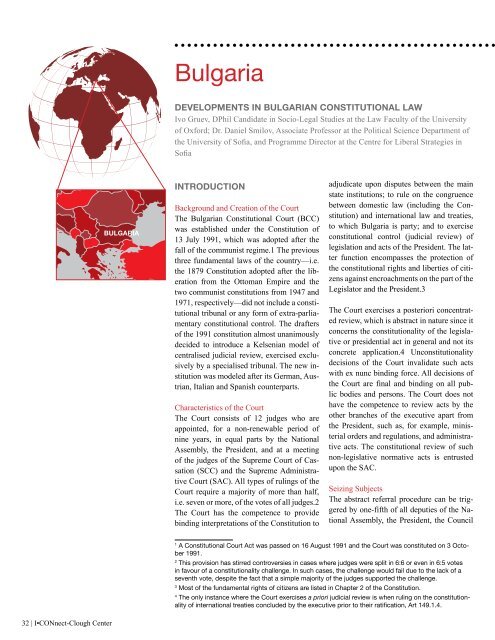2016 Global Review of Constitutional Law
I-CONnect–Clough Center collaboration.
I-CONnect–Clough Center collaboration.
You also want an ePaper? Increase the reach of your titles
YUMPU automatically turns print PDFs into web optimized ePapers that Google loves.
Bulgaria<br />
DEVELOPMENTS IN BULGARIAN CONSTITUTIONAL LAW<br />
Ivo Gruev, DPhil Candidate in Socio-Legal Studies at the <strong>Law</strong> Faculty <strong>of</strong> the University<br />
<strong>of</strong> Oxford; Dr. Daniel Smilov, Associate Pr<strong>of</strong>essor at the Political Science Department <strong>of</strong><br />
the University <strong>of</strong> S<strong>of</strong>ia, and Programme Director at the Centre for Liberal Strategies in<br />
S<strong>of</strong>ia<br />
BULGARIA<br />
INTRODUCTION<br />
Background and Creation <strong>of</strong> the Court<br />
The Bulgarian <strong>Constitutional</strong> Court (BCC)<br />
was established under the Constitution <strong>of</strong><br />
13 July 1991, which was adopted after the<br />
fall <strong>of</strong> the communist regime.1 The previous<br />
three fundamental laws <strong>of</strong> the country—i.e.<br />
the 1879 Constitution adopted after the liberation<br />
from the Ottoman Empire and the<br />
two communist constitutions from 1947 and<br />
1971, respectively—did not include a constitutional<br />
tribunal or any form <strong>of</strong> extra-parliamentary<br />
constitutional control. The drafters<br />
<strong>of</strong> the 1991 constitution almost unanimously<br />
decided to introduce a Kelsenian model <strong>of</strong><br />
centralised judicial review, exercised exclusively<br />
by a specialised tribunal. The new institution<br />
was modeled after its German, Austrian,<br />
Italian and Spanish counterparts.<br />
Characteristics <strong>of</strong> the Court<br />
The Court consists <strong>of</strong> 12 judges who are<br />
appointed, for a non-renewable period <strong>of</strong><br />
nine years, in equal parts by the National<br />
Assembly, the President, and at a meeting<br />
<strong>of</strong> the judges <strong>of</strong> the Supreme Court <strong>of</strong> Cassation<br />
(SCC) and the Supreme Administrative<br />
Court (SAC). All types <strong>of</strong> rulings <strong>of</strong> the<br />
Court require a majority <strong>of</strong> more than half,<br />
i.e. seven or more, <strong>of</strong> the votes <strong>of</strong> all judges.2<br />
The Court has the competence to provide<br />
binding interpretations <strong>of</strong> the Constitution to<br />
adjudicate upon disputes between the main<br />
state institutions; to rule on the congruence<br />
between domestic law (including the Constitution)<br />
and international law and treaties,<br />
to which Bulgaria is party; and to exercise<br />
constitutional control (judicial review) <strong>of</strong><br />
legislation and acts <strong>of</strong> the President. The latter<br />
function encompasses the protection <strong>of</strong><br />
the constitutional rights and liberties <strong>of</strong> citizens<br />
against encroachments on the part <strong>of</strong> the<br />
Legislator and the President.3<br />
The Court exercises a posteriori concentrated<br />
review, which is abstract in nature since it<br />
concerns the constitutionality <strong>of</strong> the legislative<br />
or presidential act in general and not its<br />
concrete application.4 Unconstitutionality<br />
decisions <strong>of</strong> the Court invalidate such acts<br />
with ex nunc binding force. All decisions <strong>of</strong><br />
the Court are final and binding on all public<br />
bodies and persons. The Court does not<br />
have the competence to review acts by the<br />
other branches <strong>of</strong> the executive apart from<br />
the President, such as, for example, ministerial<br />
orders and regulations, and administrative<br />
acts. The constitutional review <strong>of</strong> such<br />
non-legislative normative acts is entrusted<br />
upon the SAC.<br />
Seizing Subjects<br />
The abstract referral procedure can be triggered<br />
by one-fifth <strong>of</strong> all deputies <strong>of</strong> the National<br />
Assembly, the President, the Council<br />
1<br />
A <strong>Constitutional</strong> Court Act was passed on 16 August 1991 and the Court was constituted on 3 October<br />
1991.<br />
2<br />
This provision has stirred controversies in cases where judges were split in 6:6 or even in 6:5 votes<br />
in favour <strong>of</strong> a constitutionality challenge. In such cases, the challenge would fail due to the lack <strong>of</strong> a<br />
seventh vote, despite the fact that a simple majority <strong>of</strong> the judges supported the challenge.<br />
3<br />
Most <strong>of</strong> the fundamental rights <strong>of</strong> citizens are listed in Chapter 2 <strong>of</strong> the Constitution.<br />
4<br />
The only instance where the Court exercises a priori judicial review is when ruling on the constitutionality<br />
<strong>of</strong> international treaties concluded by the executive prior to their ratification, Art 149.1.4.<br />
32 | I•CONnect-Clough Center


